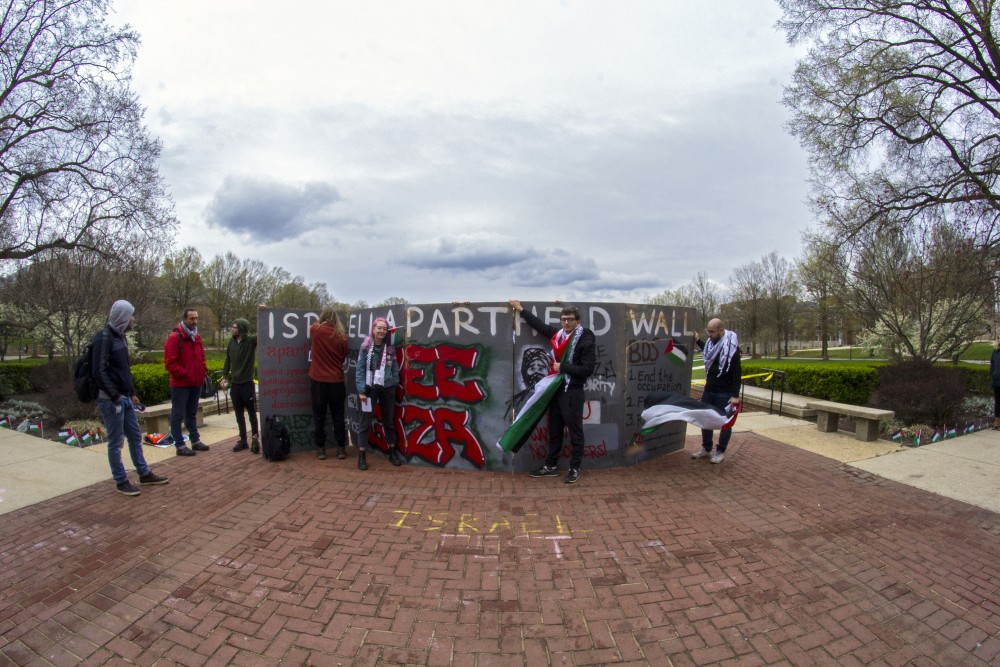By Jillian Atelsek, Christine Condon and Grace Mottley
Senior staff writers
University of Maryland students gathered on McKeldin Mall starting at 10 a.m. on Thursday for the annual celebration of Israel Fest and Israel’s Independence Day, featuring food, entertainment and camel rides.
But at the end of the mall, near McKeldin Library, the scene was entirely different.
With a Palestinian flag draped around his shoulders, and one hand supporting a brightly painted blockade labeled “Israeli Apartheid Wall” against the gusts of wind, senior anthropology major Nicholas Galloway said the festival was “a normalization and erasure of the various human rights violations that are going on in the everyday lives of Palestinians.”
“It is inherently political to say that you’re celebrating Israel,” said Galloway, a member of Students for Justice in Palestine. The organization, and other student groups, used the blockade to obstruct Israel Fest from view and encouraged students to walk around the event rather than going through it.
[Read more: UMD students celebrated Israel Fest, while boycott was held nearby]
Organizations including Maryland Hillel and the Jewish Student Union hosted the event, featuring traditional Israeli foods such as falafel, tables promoting Jewish student groups and information on Israel’s history and culture.
At about 3 p.m., anti-Israel protesters gathered around the wall for a boycott and teach-in. Speakers from groups including Students for Justice in Palestine, the Pride Alliance and the International Socialist Organization spoke and led pro-Palestine chants.
Attendees shouted phrases such as, “Free, free Palestine” and “Hey you settlers, you can’t hide, we charge you with genocide,” occasionally garnering dissent from Israel supporters in the crowd.
Several police officers were at the rally to “make sure that everything goes as sound and smooth as possible,” said Jewish Student Union president Joshua Goldstein. At several points throughout the rally, officers quieted some confrontations while speakers were presenting.
At Israel Fest in 2016, demonstrators laid near the fountain on McKeldin Mall to protest the treatment of Palestinians in Israel. University Police responded to the scene and asked them to move, resulting in a clash between students and officers, but no one was arrested.
“[The protestors] have every right to be there, and we’re going to focus on ourselves and make sure Israel Fest is as successful as possible,” said Goldstein, a junior communication major, adding that the event was “a little shy” of its usual turnout.
Freshman government and politics major Jesse Vaknin said Israel Fest was not a political event, but provided an opportunity for the roughly 6,500 Jewish students on the campus to celebrate the country and its culture.
“I love Israel, and I think that more than anything, every Jew should be here to show support for their home country and the pride that they have for it,” he said.
Israel Fest coincides with the celebration of Israel’s independence day, a day Palestinians call the Nakba, or “Catastrophe,” as a result of the land they lost.
“We don’t want to deal with them,” Vaknin said of the protestors. “Not on this day.”
The regional conflict centers on ownership and control of the land on the Gaza Strip and West Bank. In December, President Trump declared his support for an Israeli capital in Jerusalem, which both Israelis and Palestinians claim as their political capital.
“As a Jewish person, I do feel strongly that Jerusalem is the capital of Israel, the Jewish state,” freshman chemical engineering major Jeremy Rosenblatt said. “But I also understand how those who are Palestinians and sympathize with the Palestinians could see that as a slap in the face.”
For Galloway, Trump’s pro-Israel views and recognition of Jerusalem as Israel’s capital are a “huge insult” to “Palestinians who have a just claim to that land.”
“I see it as my duty … as a fellow human being to advocate for human rights, advocate for people who are the victims of a radical power imbalance,” Galloway said.
[Read more: UMD students learn about intersectionality of black and Jewish identities through food]
Freshman Shivam Shukla, an SJP member, said the boycott was intended to raise awareness for issues facing the Palestinian community at the hands of the Israeli government, but not to speak against the Jewish faith.
“A lot of people on campus don’t know — they’ll just go to Israel Fest, ride the camel, things like that — but we wanted to say that there is another side to Israel,” the computer science major said. “We are boycotting this event in solidarity with people in Palestine who have to go through these hardships by Israel’s hand every day.”
Rosenblatt said he attended the festival because he has “a strong passion for Israel.” Still, he added that he appreciated the opportunity for the opposing groups to express their views.
“It’s nice that at a university we can have such an open dialogue,” he said. “They can state their opinion, we can state ours, and both of those opinions can occupy the same space.”



